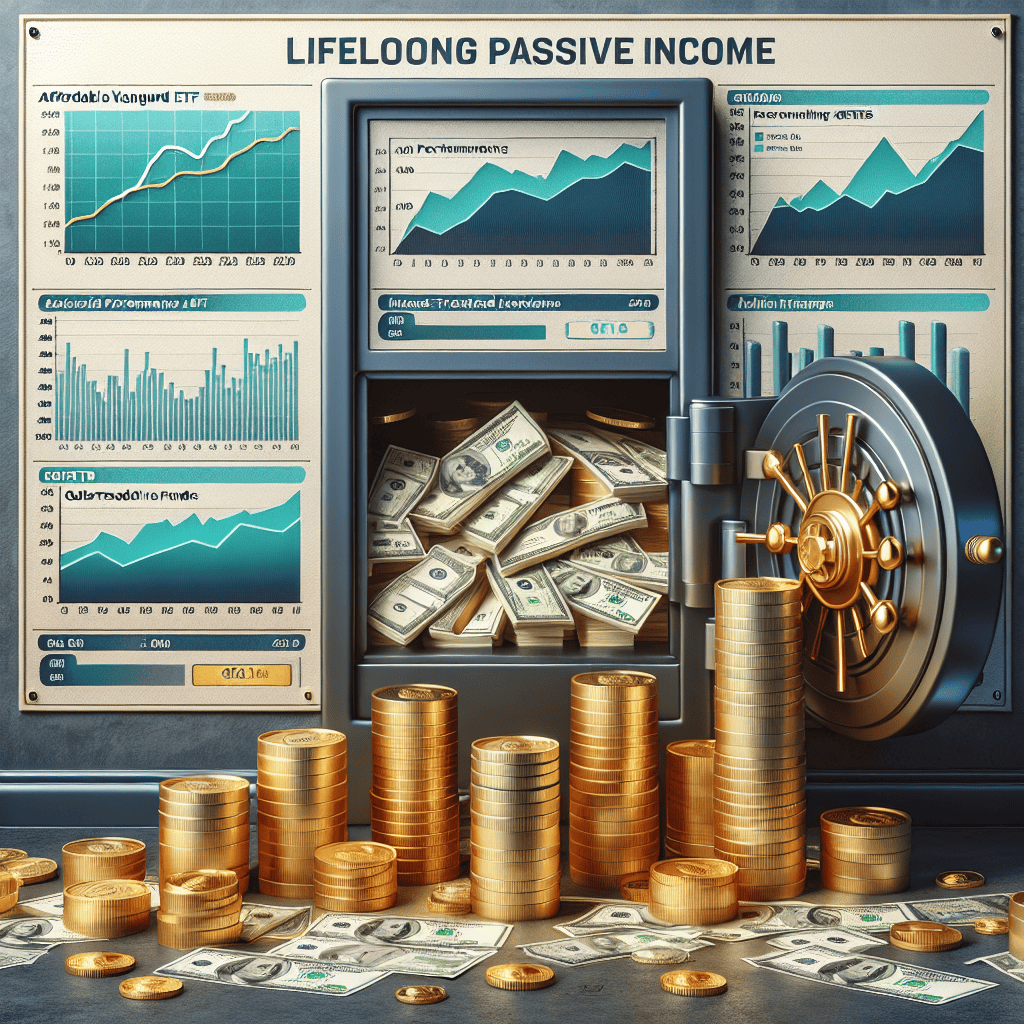“Invest Smart, Live Well: Affordable Vanguard ETFs for Lifelong Passive Income”
Introduction
Investing in affordable Vanguard ETFs (Exchange-Traded Funds) offers a strategic pathway to achieving lifelong passive income. Vanguard, renowned for its investor-friendly approach and low-cost investment options, provides a diverse range of ETFs that cater to various financial goals and risk appetites. These ETFs are designed to track specific indices, offering investors exposure to a broad spectrum of asset classes, including equities, bonds, and real estate. By focusing on low expense ratios and efficient portfolio management, Vanguard ETFs enable investors to maximize their returns over the long term. This makes them an ideal choice for those seeking to build a sustainable income stream through disciplined, passive investing. Whether you’re a seasoned investor or just starting, incorporating Vanguard ETFs into your portfolio can help you achieve financial independence and security throughout your life.
Understanding Vanguard ETFs: A Path to Affordable Passive Income
Vanguard ETFs have emerged as a popular choice for investors seeking affordable and efficient ways to generate passive income over the long term. These exchange-traded funds, known for their low expense ratios and broad diversification, offer a compelling option for those looking to build a sustainable income stream without the need for active management. Understanding the mechanics and benefits of Vanguard ETFs can provide valuable insights into how they can serve as a cornerstone of a lifelong passive income strategy.
To begin with, Vanguard ETFs are designed to track specific market indices, providing investors with exposure to a wide array of asset classes, including equities, bonds, and real estate. This diversification is crucial as it helps mitigate risk by spreading investments across various sectors and geographies. For instance, the Vanguard Total Stock Market ETF (VTI) offers exposure to the entire U.S. stock market, encompassing large, mid, and small-cap stocks. This broad exposure ensures that investors are not overly reliant on the performance of a single company or sector, thereby enhancing the stability of their income stream.
Moreover, the affordability of Vanguard ETFs is a significant advantage. With some of the lowest expense ratios in the industry, these funds allow investors to retain more of their returns. Lower costs mean that a larger portion of the investment’s earnings can be reinvested, compounding over time to generate more substantial income. This cost efficiency is particularly beneficial for long-term investors who are focused on maximizing their returns over decades.
In addition to cost advantages, Vanguard ETFs offer liquidity and flexibility, making them an attractive option for both novice and seasoned investors. Being traded on major stock exchanges, these ETFs can be bought and sold throughout the trading day at market prices. This liquidity ensures that investors can easily adjust their portfolios in response to changing market conditions or personal financial needs. Furthermore, the wide range of available Vanguard ETFs allows investors to tailor their portfolios to align with their specific income goals and risk tolerance.
Transitioning to the topic of passive income, it is important to note that Vanguard ETFs can generate income through dividends and interest payments. Many of these funds focus on dividend-paying stocks or interest-bearing bonds, providing a steady stream of income that can be reinvested or used to meet living expenses. For example, the Vanguard Dividend Appreciation ETF (VIG) targets companies with a history of increasing dividends, offering investors a reliable source of income growth over time.
Additionally, the tax efficiency of Vanguard ETFs is another factor that enhances their appeal for generating passive income. Due to their unique structure, ETFs generally incur fewer capital gains taxes compared to mutual funds. This tax efficiency means that investors can keep more of their earnings, further boosting the potential for income generation.
In conclusion, Vanguard ETFs present a viable and attractive option for those seeking to establish a lifelong passive income stream. Their low costs, broad diversification, and income-generating potential make them a cornerstone of a well-rounded investment strategy. By understanding the benefits and mechanics of these funds, investors can make informed decisions that align with their financial goals, ultimately paving the way for a secure and prosperous financial future.
Top Vanguard ETFs for Building a Lifelong Income Stream
Investing in exchange-traded funds (ETFs) has become an increasingly popular strategy for individuals seeking to build a lifelong income stream. Among the myriad of options available, Vanguard ETFs stand out due to their low costs, diversified portfolios, and strong track record of performance. For those looking to secure a stable financial future, understanding which Vanguard ETFs are most suitable for generating passive income is crucial.
To begin with, Vanguard Total Stock Market ETF (VTI) is an excellent choice for investors aiming to capture the entire U.S. stock market. This ETF provides exposure to a broad range of companies, from small-cap to large-cap, across various sectors. The diversification inherent in VTI reduces risk while offering potential for capital appreciation and dividend income. Its low expense ratio further enhances its appeal, allowing investors to retain more of their returns over time.
Transitioning to another compelling option, the Vanguard Dividend Appreciation ETF (VIG) focuses on companies with a history of increasing dividends. This ETF is particularly attractive for those seeking a steady income stream, as it invests in firms with strong fundamentals and a commitment to returning capital to shareholders. By prioritizing companies with a track record of dividend growth, VIG offers both income stability and the potential for long-term capital gains.
In addition to domestic equities, international exposure can also play a vital role in a diversified income portfolio. The Vanguard FTSE All-World ex-US ETF (VEU) provides access to a wide array of international stocks, excluding the United States. This ETF allows investors to benefit from global economic growth and diversification beyond domestic markets. By including VEU in a portfolio, investors can mitigate risks associated with any single country’s economic fluctuations, thereby enhancing the stability of their income stream.
Moreover, for those interested in fixed income, the Vanguard Total Bond Market ETF (BND) is a cornerstone of any income-focused portfolio. BND offers exposure to a broad spectrum of U.S. investment-grade bonds, including government, corporate, and mortgage-backed securities. This ETF is designed to provide a stable income stream with lower volatility compared to equities. Its inclusion in a portfolio can help balance the risks associated with stock market investments, offering a more predictable income source.
Furthermore, the Vanguard Real Estate ETF (VNQ) presents an opportunity to invest in real estate without the complexities of direct property ownership. VNQ focuses on real estate investment trusts (REITs), which are known for their high dividend yields. By investing in VNQ, individuals can gain exposure to the real estate sector’s income potential while benefiting from the liquidity and diversification that ETFs provide. This makes VNQ an attractive option for those seeking to enhance their income through real estate investments.
In conclusion, building a lifelong income stream through Vanguard ETFs involves selecting a mix of funds that align with one’s financial goals and risk tolerance. By incorporating a combination of domestic and international equities, fixed income, and real estate, investors can create a diversified portfolio that generates passive income while minimizing risk. The affordability and reliability of Vanguard ETFs make them an ideal choice for individuals committed to securing their financial future through a disciplined, long-term investment strategy. As always, it is advisable to consult with a financial advisor to tailor an investment plan that best suits individual needs and circumstances.
How to Choose the Right Vanguard ETF for Your Financial Goals
When considering investment options for generating lifelong passive income, Vanguard ETFs (Exchange-Traded Funds) stand out as a popular choice due to their low costs, diversification, and strong track record. Selecting the right Vanguard ETF to align with your financial goals requires a thoughtful approach, taking into account various factors that can influence your investment’s success. Understanding these factors can help you make informed decisions that align with your long-term financial objectives.
To begin with, it is essential to assess your risk tolerance, which is a critical component in choosing the right ETF. Vanguard offers a wide range of ETFs that cater to different risk appetites, from conservative bond funds to more aggressive equity funds. If you are risk-averse, you might consider ETFs that focus on bonds or dividend-paying stocks, which tend to offer more stability and consistent income. Conversely, if you are comfortable with higher volatility in pursuit of greater returns, equity-focused ETFs might be more suitable.
In addition to risk tolerance, your investment horizon plays a significant role in ETF selection. For those with a longer time frame, such as individuals planning for retirement several decades away, growth-oriented ETFs that invest in stocks may be appropriate. These funds have the potential for higher returns over time, albeit with increased short-term volatility. On the other hand, if your investment horizon is shorter, you might prioritize ETFs that provide steady income and preserve capital, such as those investing in bonds or dividend-focused equities.
Another crucial factor to consider is the expense ratio of the ETF. Vanguard is renowned for its low-cost investment options, which can significantly impact your overall returns over time. Lower expense ratios mean that more of your money is working for you, rather than being consumed by fees. When comparing ETFs, even a small difference in expense ratios can lead to substantial savings and enhanced returns over the long term.
Furthermore, diversification is a key principle in building a resilient investment portfolio. Vanguard ETFs offer broad exposure to various asset classes, sectors, and geographic regions, allowing investors to spread risk and reduce the impact of any single investment’s poor performance. By selecting ETFs that cover different areas of the market, you can create a balanced portfolio that aligns with your financial goals while mitigating risk.
Additionally, it is important to consider the tax implications of your ETF investments. Some Vanguard ETFs are structured to be more tax-efficient, which can be beneficial for investors in higher tax brackets. Understanding the tax treatment of dividends and capital gains associated with your chosen ETFs can help you optimize your after-tax returns.
Finally, aligning your ETF selection with your specific financial goals is paramount. Whether you aim to generate a steady stream of income, achieve capital appreciation, or a combination of both, Vanguard offers ETFs tailored to meet these objectives. By clearly defining your goals and understanding how different ETFs can help you achieve them, you can make more informed investment decisions.
In conclusion, choosing the right Vanguard ETF for your financial goals involves a careful evaluation of your risk tolerance, investment horizon, expense ratios, diversification needs, tax considerations, and specific objectives. By taking these factors into account, you can build a portfolio that not only aligns with your long-term financial aspirations but also provides the potential for lifelong passive income.
The Benefits of Investing in Vanguard ETFs for Passive Income

Investing in Vanguard ETFs offers a compelling opportunity for individuals seeking to generate lifelong passive income. As a pioneer in the world of low-cost index funds, Vanguard has established itself as a trusted name in the investment community. The benefits of investing in Vanguard ETFs are numerous, making them an attractive option for both novice and seasoned investors alike. One of the primary advantages of Vanguard ETFs is their cost-effectiveness. Vanguard is renowned for its commitment to low fees, which can significantly enhance an investor’s overall returns over time. By minimizing expenses, investors can retain a larger portion of their earnings, thereby maximizing the potential for passive income. This cost efficiency is particularly beneficial for long-term investors who are focused on building wealth gradually.
In addition to their low fees, Vanguard ETFs offer a diverse range of investment options. This diversity allows investors to tailor their portfolios to align with their specific financial goals and risk tolerance. Whether an investor is interested in domestic equities, international markets, or fixed income securities, Vanguard provides a comprehensive selection of ETFs to meet these needs. This variety not only facilitates diversification but also enables investors to capitalize on different market opportunities, thereby enhancing the potential for consistent income generation. Furthermore, Vanguard’s reputation for transparency and reliability adds an additional layer of confidence for investors. The company’s commitment to providing clear and comprehensive information about its ETFs ensures that investors are well-informed about their investment choices. This transparency is crucial for making sound investment decisions and for understanding the potential risks and rewards associated with each ETF.
Moreover, Vanguard ETFs are designed to be tax-efficient, which is a significant consideration for investors seeking passive income. The structure of ETFs generally allows for more favorable tax treatment compared to mutual funds, as they typically incur fewer capital gains distributions. This tax efficiency can result in higher after-tax returns, further enhancing the income potential for investors. Additionally, the ease of trading Vanguard ETFs on major stock exchanges provides investors with flexibility and liquidity. Unlike mutual funds, which are priced at the end of the trading day, ETFs can be bought and sold throughout the trading day at market prices. This feature allows investors to respond quickly to market changes and to manage their portfolios with greater precision.
Another noteworthy benefit of investing in Vanguard ETFs is the potential for compounding returns. By reinvesting dividends and capital gains, investors can harness the power of compounding to grow their wealth over time. This reinvestment strategy can significantly boost the overall value of an investment portfolio, thereby increasing the potential for passive income in the long run. In conclusion, Vanguard ETFs offer a multitude of benefits for investors seeking to generate lifelong passive income. Their low-cost structure, diverse investment options, transparency, tax efficiency, and liquidity make them an attractive choice for building a robust and sustainable income stream. By leveraging these advantages, investors can position themselves for financial success and enjoy the peace of mind that comes with a well-constructed investment portfolio. As such, Vanguard ETFs represent a prudent and effective strategy for those committed to achieving their long-term financial goals.
Comparing Vanguard ETFs: Finding the Best Fit for Your Portfolio
When considering investment options for generating lifelong passive income, Vanguard ETFs stand out as a reliable choice due to their low costs and diversified offerings. As investors seek to build a portfolio that aligns with their financial goals, comparing Vanguard ETFs becomes essential to identify the best fit. With a wide array of options available, understanding the nuances of each ETF can help investors make informed decisions that cater to their specific needs.
To begin with, Vanguard Total Stock Market ETF (VTI) is a popular choice for those looking to gain broad exposure to the U.S. stock market. This ETF encompasses a wide range of companies, from large-cap to small-cap, providing a comprehensive snapshot of the market. Its low expense ratio makes it an attractive option for cost-conscious investors. Moreover, VTI’s diversified nature helps mitigate risks associated with investing in individual stocks, making it a cornerstone for many portfolios.
Transitioning to international exposure, the Vanguard Total International Stock ETF (VXUS) offers investors access to global markets outside the United States. This ETF includes stocks from both developed and emerging markets, providing a balanced approach to international investing. By incorporating VXUS into a portfolio, investors can benefit from the growth potential of global economies while diversifying their holdings beyond domestic borders. This diversification can be particularly advantageous in times of economic uncertainty, as it reduces reliance on any single market.
For those interested in fixed income, the Vanguard Total Bond Market ETF (BND) serves as a foundational component of a balanced portfolio. BND offers exposure to a wide range of U.S. investment-grade bonds, including government, corporate, and mortgage-backed securities. This ETF is designed to provide stability and income, making it an ideal choice for investors seeking to preserve capital while generating steady returns. The inclusion of bonds in a portfolio can also help offset the volatility of equities, providing a smoother investment journey.
In addition to these broad-market options, Vanguard offers sector-specific ETFs for investors looking to capitalize on particular industries. For instance, the Vanguard Information Technology ETF (VGT) focuses on the tech sector, offering exposure to companies at the forefront of innovation. While sector-specific ETFs can offer higher growth potential, they also come with increased risk due to their concentrated nature. Therefore, investors should carefully consider their risk tolerance and investment horizon before committing to such options.
Furthermore, Vanguard’s commitment to low fees is a significant advantage for long-term investors. Lower fees mean that more of an investor’s money remains invested, compounding over time to generate greater returns. This cost efficiency is a hallmark of Vanguard’s investment philosophy, making their ETFs particularly appealing for those focused on maximizing passive income.
In conclusion, selecting the right Vanguard ETF for a portfolio involves evaluating one’s investment goals, risk tolerance, and time horizon. By comparing options such as VTI, VXUS, and BND, investors can construct a diversified portfolio that balances growth and income. Additionally, sector-specific ETFs like VGT offer opportunities for those willing to embrace higher risk for potentially greater rewards. Ultimately, the affordability and diversity of Vanguard ETFs make them a compelling choice for investors seeking lifelong passive income. As with any investment decision, thorough research and consideration of individual circumstances are crucial to achieving financial success.
Strategies for Maximizing Returns with Vanguard ETFs
Investing in Vanguard ETFs can be a strategic approach to generating lifelong passive income, especially for those seeking to maximize returns while minimizing risk. Vanguard, renowned for its low-cost investment options, offers a variety of exchange-traded funds (ETFs) that cater to different investment goals and risk appetites. By understanding the nuances of these ETFs and employing effective strategies, investors can enhance their portfolios and secure a steady stream of income.
To begin with, it is essential to recognize the advantages of choosing Vanguard ETFs. One of the primary benefits is their low expense ratios, which are among the most competitive in the industry. Lower fees mean that a larger portion of the investment returns remains in the investor’s pocket, compounding over time to generate significant wealth. Additionally, Vanguard’s reputation for transparency and reliability provides investors with confidence in their investment choices.
When considering strategies for maximizing returns, diversification emerges as a key principle. Diversifying across various asset classes and sectors can mitigate risks and enhance potential returns. Vanguard offers a wide array of ETFs that cover different market segments, including equities, bonds, and real estate. For instance, the Vanguard Total Stock Market ETF (VTI) provides exposure to the entire U.S. stock market, while the Vanguard Total Bond Market ETF (BND) offers a comprehensive bond market investment. By combining these ETFs, investors can achieve a balanced portfolio that captures growth opportunities while providing stability.
Moreover, dividend-focused ETFs can be particularly appealing for those seeking passive income. Vanguard’s Dividend Appreciation ETF (VIG) and High Dividend Yield ETF (VYM) are designed to provide investors with exposure to companies that have a history of paying and increasing dividends. These ETFs not only offer the potential for capital appreciation but also deliver regular income through dividend payments. By reinvesting these dividends, investors can further enhance their returns through the power of compounding.
In addition to diversification and dividend-focused strategies, it is crucial to adopt a long-term investment perspective. The stock market is inherently volatile, with short-term fluctuations that can unsettle even the most seasoned investors. However, by maintaining a long-term outlook and resisting the urge to react to market volatility, investors can benefit from the overall upward trajectory of the market. Vanguard ETFs, with their broad market exposure and low costs, are well-suited for a buy-and-hold strategy that capitalizes on long-term growth.
Furthermore, regular portfolio rebalancing is an essential practice for maximizing returns. Over time, certain assets within a portfolio may outperform others, leading to an imbalance that can increase risk. By periodically reviewing and adjusting the allocation of assets, investors can ensure that their portfolios remain aligned with their investment goals and risk tolerance. Vanguard’s platform offers tools and resources to assist investors in this process, making it easier to maintain an optimal portfolio balance.
In conclusion, investing in Vanguard ETFs presents a viable pathway to achieving lifelong passive income. By leveraging the benefits of low-cost, diversified, and dividend-focused ETFs, investors can construct a robust portfolio that maximizes returns while minimizing risk. Adopting a long-term perspective and regularly rebalancing the portfolio further enhances the potential for success. As investors navigate the complexities of the financial markets, these strategies can serve as a foundation for building wealth and securing financial independence.
The Role of Vanguard ETFs in a Diversified Investment Strategy
Vanguard ETFs have become a cornerstone for investors seeking to build a diversified investment strategy that generates lifelong passive income. These exchange-traded funds offer a cost-effective way to gain exposure to a broad array of asset classes, making them an attractive option for both novice and seasoned investors. As the financial landscape continues to evolve, the role of Vanguard ETFs in a diversified portfolio cannot be overstated, particularly for those aiming to achieve financial independence through passive income streams.
To begin with, Vanguard ETFs are renowned for their low expense ratios, which are a critical factor in maximizing investment returns over the long term. By minimizing costs, investors can retain a larger portion of their returns, which can then be reinvested to compound over time. This cost efficiency is particularly beneficial in a diversified investment strategy, where the cumulative effect of low fees can significantly enhance overall portfolio performance. Moreover, Vanguard’s commitment to low-cost investing aligns with the principles of passive income generation, where the focus is on sustainable, long-term growth rather than short-term gains.
In addition to their cost advantages, Vanguard ETFs offer a wide range of investment options that cater to different risk appetites and financial goals. For instance, investors seeking stability and consistent income might consider Vanguard’s bond ETFs, which provide exposure to government and corporate bonds. These funds can serve as a reliable source of passive income, especially in a low-interest-rate environment. On the other hand, those with a higher risk tolerance might opt for equity ETFs, which offer the potential for capital appreciation alongside dividend income. By including a mix of bond and equity ETFs, investors can achieve a balanced portfolio that mitigates risk while capitalizing on growth opportunities.
Furthermore, Vanguard ETFs are designed to track specific indices, ensuring that investors benefit from broad market exposure. This index-tracking approach not only simplifies the investment process but also reduces the need for active management, which can be both time-consuming and costly. As a result, investors can enjoy the peace of mind that comes with knowing their investments are aligned with market performance, without the need for constant monitoring or adjustment. This passive management style is particularly appealing for those focused on generating lifelong passive income, as it allows them to focus on other aspects of their financial plan.
Another key advantage of incorporating Vanguard ETFs into a diversified investment strategy is their liquidity. As exchange-traded funds, they can be bought and sold on the stock exchange throughout the trading day, providing investors with the flexibility to adjust their portfolios as needed. This liquidity is especially important in times of market volatility, where the ability to quickly rebalance a portfolio can help mitigate potential losses. Additionally, the transparency of Vanguard ETFs, with their holdings and performance data readily available, enables investors to make informed decisions about their investments.
In conclusion, Vanguard ETFs play a vital role in a diversified investment strategy aimed at generating lifelong passive income. Their low costs, broad market exposure, and ease of management make them an ideal choice for investors seeking to build a robust portfolio that can withstand the test of time. By leveraging the unique benefits of Vanguard ETFs, investors can create a sustainable income stream that supports their financial goals and provides security for the future. As the investment landscape continues to evolve, the importance of these funds in achieving financial independence will undoubtedly remain significant.
Q&A
1. **What is an affordable Vanguard ETF for dividend income?**
Vanguard High Dividend Yield ETF (VYM) is a popular choice for those seeking dividend income.
2. **Which Vanguard ETF focuses on total stock market exposure?**
Vanguard Total Stock Market ETF (VTI) provides exposure to the entire U.S. stock market.
3. **What is a good Vanguard ETF for international diversification?**
Vanguard Total International Stock ETF (VXUS) offers exposure to global markets outside the U.S.
4. **Which Vanguard ETF is suitable for bond income?**
Vanguard Total Bond Market ETF (BND) is ideal for those looking for income from bonds.
5. **What Vanguard ETF targets growth stocks?**
Vanguard Growth ETF (VUG) focuses on large-cap growth stocks in the U.S.
6. **Which Vanguard ETF is designed for value investing?**
Vanguard Value ETF (VTV) targets large-cap value stocks.
7. **What is a Vanguard ETF for balanced exposure to stocks and bonds?**
Vanguard Balanced Index Fund ETF (VBINX) provides a mix of stocks and bonds for balanced growth and income.
Conclusion
Affordable Vanguard ETFs offer a compelling option for investors seeking lifelong passive income due to their low expense ratios, broad diversification, and strong track record of performance. These ETFs provide exposure to a wide range of asset classes, including equities and bonds, which can help mitigate risk and enhance returns over the long term. By focusing on index-based strategies, Vanguard ETFs allow investors to benefit from market growth while minimizing costs, making them an attractive choice for building a sustainable income stream. Additionally, the ease of reinvestment and the potential for dividend growth further enhance their appeal for those looking to secure financial stability throughout their lifetime. Overall, Vanguard’s commitment to investor value and cost efficiency makes their ETFs a prudent choice for individuals aiming to achieve consistent and reliable passive income.





